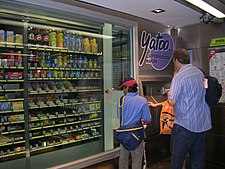

An automated convenience store is a convenience store that operates without a cashier, and instead relies on computers and robotics.


An automated convenience store is a convenience store that operates without a cashier, and instead relies on computers and robotics.
Examples include Keedoozle, Amazon Go, Żabka Nano, Robomart, Shop24, and SmartMart.
Robomart has created an autonomous grocery store on wheels that offers consumers the ability to pick their own groceries at home checkout-free. [1] [2] [3] [4] [5] [6] [7] [8] [9] [10] [11]
Shop24 operates 170 automated convenience stores in nine European countries and 7 in the United States. An average store costs $90,000. [12] [13]
In 1986, after entrepreneur Mike Rivalto's wife came home irritated and frustrated due to the long checkout line in the convenience store, Rivalto conceived the SmartMart, an automated convenience store. After seven years of research and development, the concept was ready to become a reality when technology caught up to the idea in the mid-1990s. In 2003, the first proof of concept store was opened at a location in East Memphis. [14] [15] In 2011, after the store did more than 1.4 million transactions in eight years, it was replaced by SmartMart's latest technology. At SmartMart, a consumer can drive in or walk up to a computer touch screen and select from up to 1,800 products available. The machine accepts payments by cash, credit or debit card and delivers purchased items through a drawer. Development of the SmartMart including gas pumps costs approximately $100,000 more than a 3,000 square foot convenience store, but the labor savings are substantial as a single control center worker can operate the entire business. [16] In 2009, deputies accused SmartMart of selling a 24-ounce can of beer to an underage buyer. [17]

A convenience store, convenience shop, bodega, corner store, corner shop, superette or mini-mart is a small retail store that stocks a range of everyday items such as convenience food, groceries, beverages, tobacco products, lottery tickets, over-the-counter drugs, toiletries, newspapers and magazines.

A supermarket is a self-service shop offering a wide variety of food, beverages and household products, organized into sections. Strictly speaking, a supermarket is larger and has a wider selection than earlier grocery stores, but is smaller and more limited in the range of merchandise than a hypermarket or big-box market. In everyday American English usage, however, "grocery store" is often casually used as a synonym for "supermarket". The supermarket retail format first appeared around 1930 in the United States as the culmination of almost two decades of retail innovations, and began to spread to other countries after extensive worldwide publicity in 1956.

A grocery store (AE), grocery shop or grocer's shop (BE) or simply grocery is a retail store that primarily retails a general range of food products, which may be fresh or packaged. In everyday U.S. usage, however, "grocery store" is a synonym for supermarket, and is not used to refer to other types of stores that sell groceries. In the UK, shops that sell food are distinguished as grocers or grocery shops
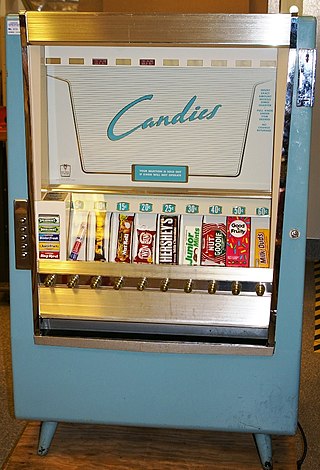
A vending machine is an automated machine that dispenses items such as snacks, beverages, cigarettes, and lottery tickets to consumers after cash, a credit card, or other forms of payment are inserted into the machine or payment is otherwise made. The first modern vending machines were developed in England in the early 1880s and dispensed postcards. Vending machines exist in many countries and, in more recent times, specialized vending machines that provide less common products compared to traditional vending machine items have been created.
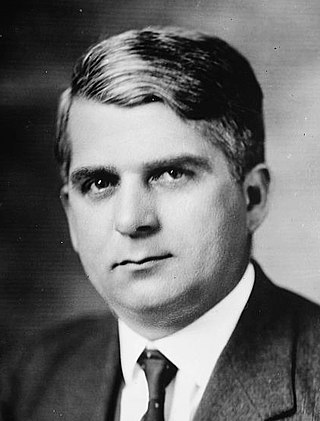
Clarence Saunders was an American grocer who first developed the modern retail sales model of self service. His ideas have had a massive influence on the development of the modern supermarket. Saunders worked for most of his life trying to develop a truly automated store, developing Piggly Wiggly, Keedoozle, and Foodelectric store concepts.

Bagger, packer, sacker or bag boy (US) is an unofficial title given to a courtesy clerk at a grocery store.
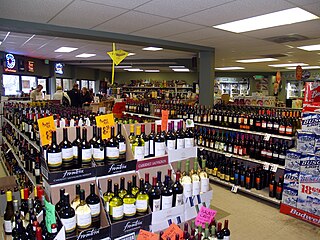
A liquor store is a retail business that predominantly sells prepackaged alcoholic beverages, including liquors, wine or beer, usually intended to be consumed off the store's premises. Depending on region and local idiom, they may also be called an off-licence, off-sale, bottle shop, bottle store or, colloquially, bottle-o, liquor store or other similar terms. A very limited number of jurisdictions have an alcohol monopoly. In US states that are alcoholic beverage control (ABC) states, the term ABC store may be used.

A smartstore is a brick-and-mortar retail establishment using smart technologies like smart shelves, smart carts, or smart cards. Smartstores usually deliver their services via the Web, smart phone apps, and augmented reality applications in real stores.

Chedraui( Chedraui Group) is a publicly traded Mexican grocery store and department store chain which also operates stores in the U.S. in the states of California, Arizona, New Mexico, Texas, and Nevada under the banner name El Super and stores in Texas under the banner name Fiesta Mart. It is traded on the Mexican Stock Exchange under the symbol CHEDRAUI.

Keedoozle was the first fully automated grocery store in the United States, a vending machine concept developed by grocer Clarence Saunders in 1937. It is often held that the name "Keedoozle" was coined by Saunders to refer to the technology used, in which a "Key Does All" for the grocery shopper, but another interview with Saunders appears to contradict this.
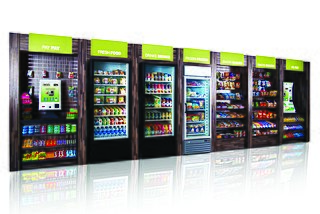
Micro Markets constitutes a retail sector closely associated with the vending machine industry.
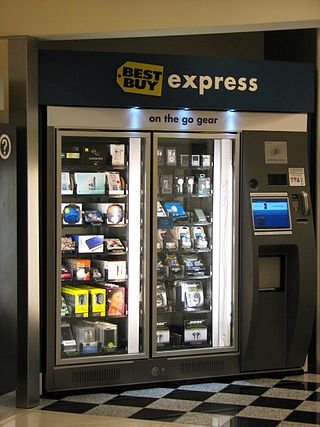
Automated retail is the category of self-service, standalone kiosks that operate as fully automatic retail stores through the use of software integrations to replace the traditional retail services inside in a traditional retail store. These standalone kiosks are often located in heavily trafficked locations such as airports, malls, resorts and transit hubs.

Amazon Go is a chain of convenience stores in the United States and the United Kingdom, operated by the online retailer Amazon. The stores are cashierless, thus partially automated, with customers having the ability to purchase products without being checked out by a cashier or using a self-checkout station. As of 2023, there are 43 open and announced store locations in Seattle, Chicago, Los Angeles, London and New York City.
PC Express is a grocery click and collect & delivery service owned by Canadian retail conglomerate Loblaw Companies. The service began in October 2014 and the company now has over 700 pickup locations and delivers to ~70% of Canadian households. These locations include curbside pickup, self-serve kiosks, refrigerated vans, and Shoppers Drug Mart locations in urban areas. The Loblaw Companies banners participating in PC Express are Dominion, Fortinos, Loblaws, Maxi, No Frills, Provigo, Real Atlantic Superstore, Real Canadian Superstore, Valu-mart, Your Independent Grocer and Zehrs Markets. A service fee of $3 to $5 is added to each order, unless a customer has a PC Express Pass subscription. Delivery is provided by Instacart contractors. A rapid delivery option with marked up item costs is also available, which uses DoorDash Dashers to pick and deliver each order.
Robomart is an American technology company headquartered in Santa Monica, California that builds autonomous smart shops for cafes, ice cream parlors, and quick-service restaurants. The company’s white label platform gives retailers the option to expand their footprint at a significantly lower cost than traditional brick-and-mortar real-estate.
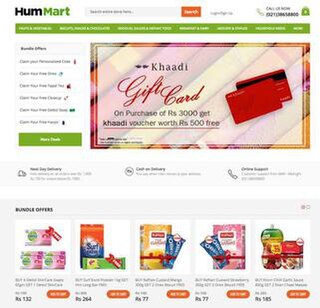
Hum Mart was a Pakistani online store operated by Hum Network. It became defunct in 2020.
The retail format influences the consumer's store choice and addresses the consumer's expectations. At its most basic level, a retail format is a simple marketplace, that is; a location where goods and services are exchanged. In some parts of the world, the retail sector is still dominated by small family-run stores, but large retail chains are increasingly dominating the sector, because they can exert considerable buying power and pass on the savings in the form of lower prices. Many of these large retail chains also produce their own private labels which compete alongside manufacturer brands. Considerable consolidation of retail stores has changed the retail landscape, transferring power away from wholesalers and into the hands of the large retail chains.

Caper is a software technology company that develops and deploys AI-powered automated checkout devices as well as AI-based software applications for retailers, grocers, convenience stores and other general merchandising store formats. Caper AI was established in 2016 by Lindon Gao, York Yang, Yilin Huang and Ahmed Beshry. It is headquartered in Manhattan, New York.

A cashierless store is a store which allows customers to shop their products and leave without having to wait in line and pay at a checkout. Cashierless stores can currently be found in the United States, Asia, Europe, the Middle East, and Africa.
Gatik is an autonomous trucking and delivery company that operates in the United States and Canada. The company creates Level 4 autonomous trucking technology for vehicles making middle mile commercial deliveries.